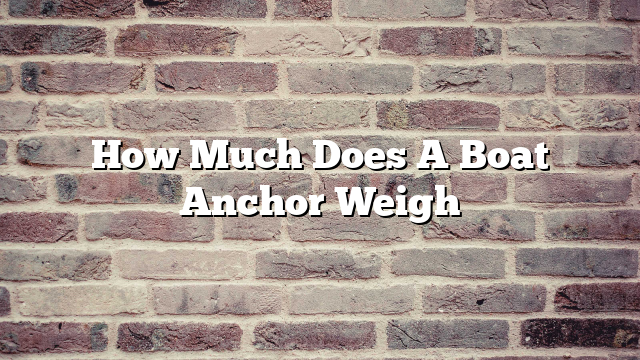Are you a boating enthusiast or perhaps considering purchasing your very own vessel? If so, you may have found yourself wondering about the weight of a boat anchor. While it may seem like a simple question, the weight of a boat anchor plays a significant role in ensuring the safety and stability of a boat while it is at anchor.
In this article, we will delve into the world of boat anchors, exploring the factors that determine their weight and why it matters. Whether you are a seasoned sailor or a beginner, understanding the importance of selecting the right anchor weight for your boat can make all the difference in your boating experience. So, let’s set sail on this informative journey and discover the weighty topic of boat anchors!
A boat anchor’s weight depends on its size and type. On average, a small boat anchor can weigh around 10 to 20 pounds, while larger anchors for bigger boats can weigh between 50 to 100 pounds or more.
How Much Does a Boat Anchor Weigh?
Boat anchors come in various sizes and weights, and selecting the right anchor for your boat is crucial for safe and secure anchoring. The weight of a boat anchor depends on several factors, including the size of your boat, the type of anchor, and the conditions in which you’ll be anchoring. In this article, we will guide you through the process of determining the appropriate weight for your boat anchor, ensuring you have the necessary information to make an informed decision.
Factors Affecting the Weight of a Boat Anchor
When determining the weight of a boat anchor, there are several factors to consider. Firstly, the size and weight of your boat play a significant role in determining the anchor weight. A larger boat will require a heavier anchor to ensure it stays securely in place. Additionally, the type of anchor you choose will impact its weight. Different anchor designs have varying weights due to their construction and materials used.
The conditions in which you plan to anchor your boat also influence the anchor weight. If you frequently anchor in strong currents or rough waters, a heavier anchor is necessary to provide sufficient holding power. Conversely, if you typically navigate calm waters with minimal tidal or current movement, a lighter anchor may be suitable.
Determining the Appropriate Anchor Weight
Choosing the right anchor weight is crucial to ensure your boat stays in place, even in adverse conditions. To determine the appropriate weight, you should consider the length and displacement of your boat. As a general rule of thumb, it is recommended that your anchor weight be approximately 1/8th of your boat’s total weight.
For example, if your boat weighs 8,000 pounds, the recommended anchor weight would be around 1,000 pounds. However, keep in mind that this is a general guideline, and you may need to adjust the weight based on other factors such as the type of anchor and prevailing conditions in your boating area.
Conclusion
Choosing the right weight for your boat anchor is essential for safe and effective anchoring. By considering factors such as boat size, anchor type, and prevailing conditions, you can determine the appropriate anchor weight for your specific needs. Remember to always consult manufacturer guidelines and seek advice from experienced boaters if you’re unsure about the best anchor weight for your boat.
Frequently Asked Questions
Here are some commonly asked questions about the weight of a boat anchor:
1. How much does a boat anchor weigh?
Anchors for boats can vary in weight depending on the size and type of the boat. Typically, smaller boats such as kayaks or dinghies may use anchors weighing around 5 to 10 pounds. Medium-sized boats like sailboats or fishing boats may require anchors weighing between 15 and 30 pounds. Larger vessels, such as yachts or commercial ships, may use anchors weighing anywhere from 50 to 200 pounds or more.
It’s important to choose an anchor that is appropriate for the size and weight of your boat, as using an anchor that is too light may not hold the boat securely in place, while using an anchor that is too heavy may be difficult to handle and store.
2. What factors determine the weight of a boat anchor?
Several factors come into play when determining the weight of a boat anchor. The size and type of the boat, as well as the intended use and the conditions in which the anchor will be used, all affect the weight selection. For example, a larger boat or one that frequently operates in strong currents or rough waters may require a heavier anchor for better holding power.
Additionally, the type of seabed or bottom conditions where the anchor will be deployed can influence the weight selection. Soft or sandy bottoms may require a heavier anchor to ensure proper holding, while rocky or hard seabeds may allow for a lighter anchor.
3. Are there any guidelines for selecting the right anchor weight?
Yes, there are general guidelines that can help in selecting the appropriate anchor weight. The general rule of thumb is to choose an anchor that weighs approximately 1 pound per foot of boat length. However, this is just a rough estimate, and other factors such as the boat’s windage, the expected conditions, and personal preference should also be taken into consideration.
It is recommended to consult with experts or refer to the manufacturer’s guidelines for specific anchor weight recommendations based on your boat’s specifications and the intended usage.
4. Can I use multiple anchors for added security?
Using multiple anchors can provide added security in certain situations. For example, in areas with strong currents or high winds, deploying multiple anchors can help distribute the load and improve holding power. This technique, known as “double anchoring” or “tandem anchoring,” involves using two or more anchors set in different directions to counteract the forces acting on the boat.
However, it is important to ensure that the combined weight of the anchors does not exceed the recommended maximum weight for your boat’s anchor system. Consult the manufacturer’s guidelines or seek advice from experts to determine if using multiple anchors is suitable for your vessel.
5. How should I store and transport a heavy boat anchor?
Storing and transporting a heavy boat anchor requires careful consideration to ensure safety and convenience. Many anchors are designed to be disassembled for easier storage and transportation. Some anchors have removable shanks or collapsible designs, allowing them to be stored in smaller spaces.
When handling and transporting a heavy anchor, it is important to use proper lifting techniques and ensure the anchor is securely fastened or stowed to prevent any accidents or damage. Consider using anchor storage bags or dedicated compartments on your boat to keep the anchor in place and avoid unnecessary movement during transit.
In conclusion, the weight of a boat anchor is a crucial consideration for anyone involved in boating activities. Whether you are a seasoned sailor or a beginner, understanding the weight of your anchor is essential for maintaining stability and ensuring safety on the water. From small recreational boats to large commercial vessels, the weight of an anchor can vary significantly depending on the size and type of the boat. It is important to consult the manufacturer’s guidelines or seek advice from experienced boaters to determine the appropriate anchor weight for your specific vessel.
Furthermore, the weight of a boat anchor is not only important for maintaining stability but also for securing the boat in various weather conditions. A heavy anchor provides better holding power, making it more effective in strong winds and currents. On the other hand, a lightweight anchor may be more suitable for smaller boats or shallow waters. It is crucial to strike the right balance between the weight of the anchor and the size of your boat to ensure optimal performance and safety.
In conclusion, understanding the weight of a boat anchor is an essential aspect of boating. By considering factors such as boat size, type, and prevailing weather conditions, boaters can determine the appropriate anchor weight to maintain stability and security on the water. Remember to consult manufacturer guidelines or seek advice from experienced boaters to make informed decisions about your boat anchor weight and enjoy a safe and enjoyable boating experience.

















